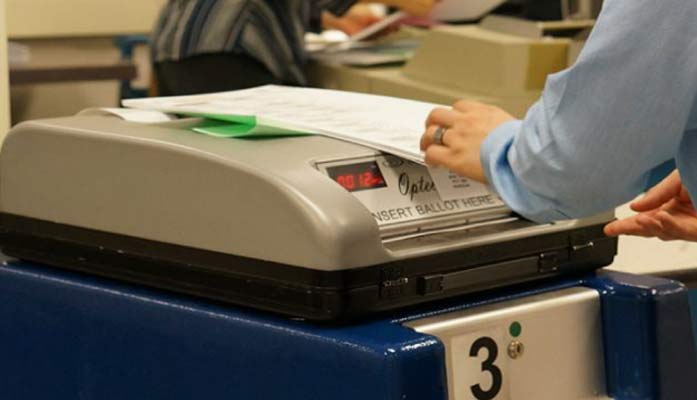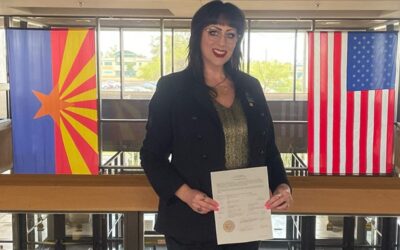By Corinne Murdock |
A total of seven out of election integrity bills considered by the Arizona Senate Government Committee on Monday were passed; due to time constraints, an additional six bills were held for later discussion. The committee passed the bills 4-3, every time along party lines, with the exception of State Senator Martín Quezada’s (D-Glendale) vote for SB1411.
Among those passed were SB1362, requiring every county recorder to tabulate early ballots at a polling place or voting center by 2024; SB1404, repealing the Active Early Voting List (AEVL) and limiting early ballot voting eligibility to those who expect to be absent from their precinct at the time of the election, are physically unable to go to the polls, are 65 or older, whose residence is over 15 miles from the polling place or precinct, can’t attend to polls on election day due to their religion, have a visual impairment, or qualifies as eligible via the Uniformed and Overseas Citizens Absentee Voting Act; SB1411, requiring counties with over 100,000 citizens provide an early ballot tracking system for their citizens by 2024; SB1357, prohibiting elections machines or devices that were certified by laboratories not accredited at time of certification; SB1358, requiring ballots from counties with voting centers to be separated and grouped by precinct; SB1457, requiring the Secretary of State (SOS) to ensure election machines meet standards such as no internet access, ability to sustain and track multiple users with unique credentials, and updated operating systems and software that match U.S. Department of Homeland Security standards; and SB1474, declaring primary and general election days as state holidays, prohibiting voting locations from being used as on-site early voting, and establishing voting on election day only.
For SB1357, State Senator Hatathlie said she couldn’t vote for the bill because nobody had answered whether or not the machines that were used during the last election were certified.
State Senator Kelly Townsend (R-Mesa) reminded the floor that there was testimony addressing Hatathlie’s concerns; she said that she also learned the EAC missed members so that they couldn’t vote.
“I’m not sure if that’s why they let the accreditation lapse for some of these groups, but at the time that they certified these machines they did not have a valid accreditation. Therefore it’s in question whether or not they certified [the machines] legally,” said Townsend.
The Arizona Association of Counties (AACo) spoke out against several bills, including: SB1358, SB1457, and SB1474.
AACo Executive Director Jennifer Marson argued that SB1358’s requirement to separate ballots by precinct would take counties backwards. Townsend rebutted that vote centers made it more difficult to weed out “bad actors” stuffing ballots and overvoting, versus tabulations that take place at the precinct level. Marson then argued that centers have the ability to access precinct totals and other pertinent organizational information through election management software. Townsend responded that compiling all the ballots together without separation for precinct would make review of them difficult if not impossible after initial counting, especially for audits. She used the example of her time at the retail clothing chain, Miller’s Outpost, prior to electronic filing, meaning she relied on an expansive paper filing system to check customers’ credit card information. Similar to ballots, Townsend argued, the necessity of breaking down all of that stored information into categories and subcategories made it easier to locate and review.
As for SB1457, AACo Senior Legislative Associate Megan Kintner informed the committee that their equipment wouldn’t allow for their operations to create individualized codes for every single poll worker. She added that the bill’s requirement for additional observers would be difficult to satisfy because they already had a hard time securing volunteers. Kittner also noted that the bill didn’t address what counties should do when volunteers don’t show up. Townsend responded that Kittner’s colleague, Marson, told her that the unique log-ins were possible to do, with the exception of volunteers checking people in for poll books, and suggested that Kittner check back in with Marson on that information. Majority Whip Sonny Borrelli (R-Lake Havasu City) ignored Kintner’s concerns of logistics, emphasizing the greater need for accountability. Borrelli also challenged the general notion that no backdoor access was possible with election machines.
“Nothing is ‘not hackable,’ so let’s put as much prevention in it as possible. I’ve said this before: keep locks on your doors, keep honest people honest,” insisted Borrelli. “The intent is, whoever’s going to log into the system, we need to know who they are,”
SB1457 may receive some additional language; Borrelli was open to a suggestion from Townsend on adding an accountability aspect for video streams that get interrupted, such as a requirement to stop counting. Borrelli noted that even the legislature has to pause its operations when their streaming system goes down.
Townsend said that the bill would ward off bad actors relying on ease of access through community log-ins. She referenced the Miller’s Outpost operations again, noting that they had unique log-ins for their employees.
Marson said that voting machines have existed in America since 1881, and that states back then could select their own election day. The referenced voting machine relied on push button and interlock mechanics to select only single candidates per race and then reset for a new vote after the voter left the booth. When Townsend asked how long it took precincts to count votes when they counted by hand only, Marson said she didn’t know and couldn’t find the answer. However, Marson said that records reflected that states had several months to file their results, meaning they didn’t have a rush to complete their work in a day.
“I think this just underscores the idea that we should do a lot of research to see what can be restored, and what makes sense and what doesn’t,” said Townsend.
Although the committee denied Quezada’s amendment to SB1474 removing language about prohibiting voting locations from being used as on-site early voting, Townsend revealed that some within the Republican caucus oppose the bill, meaning she’ll have to make inroads with
“I still think that precinct voting on the day of and having a holiday is better, but we have to get it on the governor’s desk,” said Townsend.
Marson spoke up again to question how the elections would be conducted if public bodies were ordered to be closed, and asked when elections officials running the elections would have time to vote. Her questions weren’t addressed. Committee Democrats insisted that there wasn’t evidence of widespread fraud that necessitated this bill.
Due to time constraints, Townsend held the other bills for review another day: SB1058, prohibiting drive-up voting and voting through a drop box outside of a polling place, voting center, or the offices of either the county recorder or elections department; SB1343, requiring all early, provisional, and conditional provisional ballots to be separated, tabulated, and recorded by their precinct and category; SB1359, requiring all elections workers to have a unique password for accessing any election system, which would be changed every two weeks; SB1360, expanding rights for election observers such as documenting their observations, appealing an ejection from the election location, and asking questions of election officials; SB1380, requiring county recorders to use USPS National Change of Address (NCOA) information to weed out voters whose address changed; and SB1477, requiring the Secretary of State (SOS) to notify county recorders of relevant felony convictions every month.
Corinne Murdock is a reporter for AZ Free News. Follow her latest on Twitter, or email tips to corinne@azfreenews.com.








